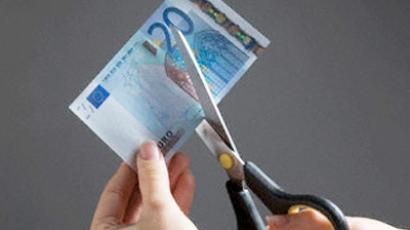Late-learner Latvia plans to join eurozone amid crisis
Latvia is willing to pay its share in any future bailouts of indebted euro nations, maintaining plans to join the monetary union by 2014. Euroskeptics say the step would be nothing short of economic suicide for Riga.
“I believe that the latest measures in Italy, Spain and Ireland will be successful, but even if new difficulties should arise, we are willing to make our contribution, even if it is relatively small,” said central bank Governor Ilmars Rimsevics, as cited by Bloomberg. However, Aivars Lembergs, mayor of port-city Ventspils, compares participation in bailout funds to boarding a sinking ship.“Latvia will have to participate in the bailout fund – and that’s a 4-billion-euro contribution with our GDP at only 14 billion,” he told RT. “I think it’s like we’re being invited to a Titanic – the ship is sinking and we’re being asked to board it and try to take the water out.”Latvia has only just now started to recuperate from the recession, which made it one of the most economically affected EU countries. It still has the highest poverty-risk rate in Europe, alarming unemployment and a vast gap between rich and poor. While Poland recently rejected the idea of having the euro by 2014, the Latvian government still firmly believes that the single currency will make its problems go away. “Latvia has made very clear its intentions to adopt the euro in 2014. All the policy settings in the past two years have been consistent with that,” says David Moore, Resident Representative of the IMF in Latvia.Economists say that Latvia can meet the euro adoption criteria. What worries them is whether Riga will be able to afford it. Especially with the alarming number of those fleeing Latvia – hundreds of thousands have already left the country in the wake of the recession.Earlier, Latvia’s Baltic neighbor Estonia went down the euro-path with mixed results. In 2009, Estonia passed austerity measures to meet eurozone accession criteria and it converted to the euro in 2011. A year later, the country’s chancellor of justice reports of lower wages, poor social welfare and some 60,000 children living below the poverty line.














